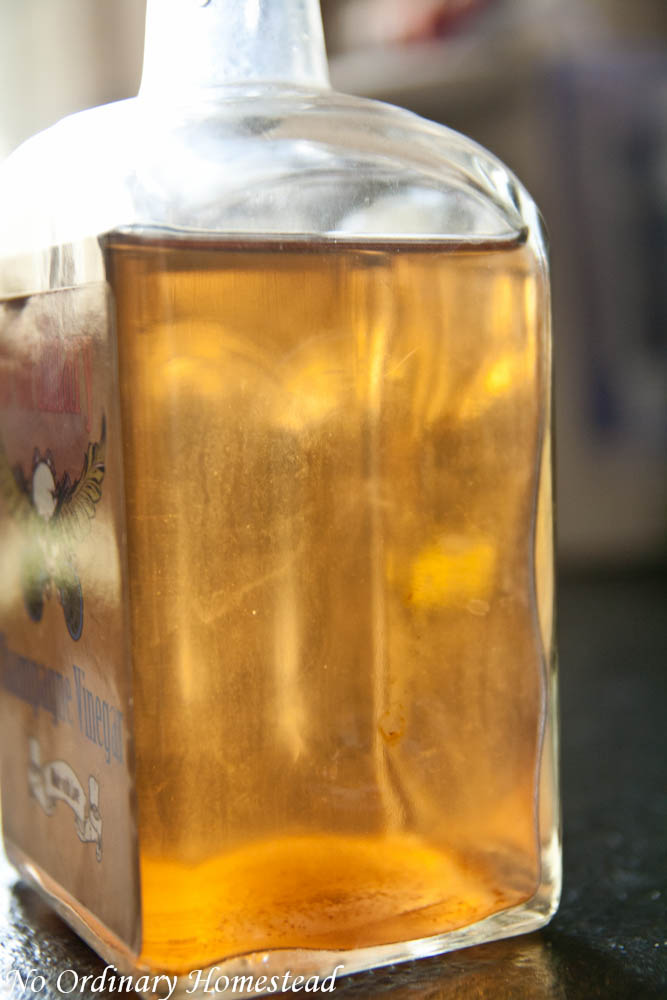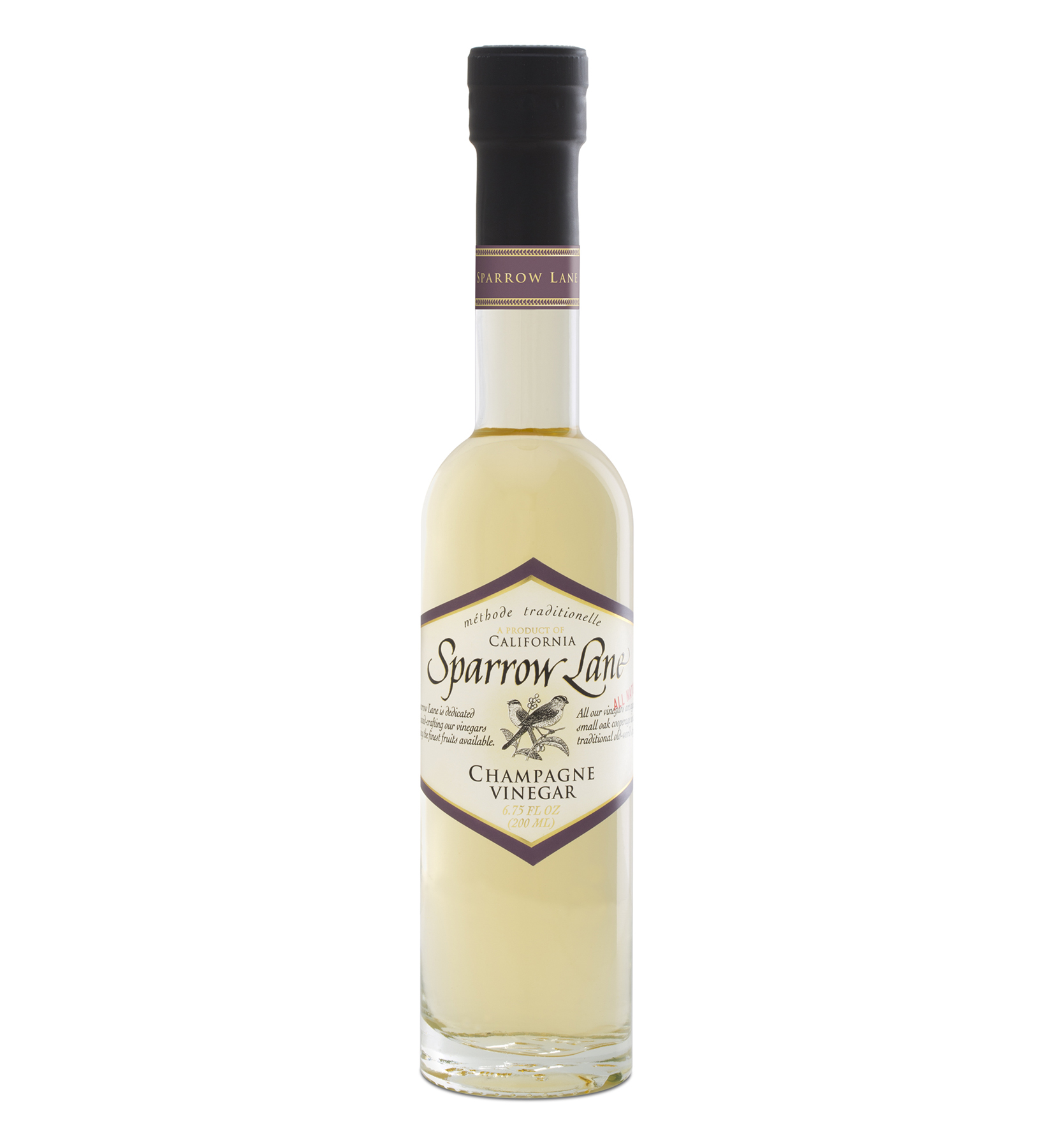Leftover Champagne Vinegar Recipe Champagne vinegar, Champagne

Leftover Flat Champagne? Make Vinegar! Best champagne, Champagne
Step 1: Preparation Before Starting. Decide where you'll keep your vinegar. It should be a place where it can stay ( the vinegar mother doesn't respond well to being moved; it can become dislodged and discontinue making vinegar). It will need warmth (70-80 degrees is ideal), darkness and good air circulation.

How to make champagne vinegar No Ordinary Homestead
1 Choose your wine. You can combine a few glasses of leftover wine or buy a fresh bottle to use. Don't mix red and white wine together. Instead, either make white wine vinegar or red wine vinegar. Red wine vinegar is great for bold salad dressings, hot and sour soup and deglazing cooking pans.

Champagne Gone Flat? Make Champagne Vinegar! This Mess is Ours
Simply pour the liquid into a well-washed mason jar (or other wide-mouthed vessel like a crock) and cover with a couple of layers of cheesecloth (to prevent dust or bugs from getting into it. Then, just store it in a cool, dark place for a month to six months.

A Visual 9 Step Process How Champagne is Made Enobytes Food & Wine
Ingredients You Need to Make Champagne Vinaigrette Champagne Vinegar: You can also use white wine vinegar. Dijon Mustard: Smooth and creamy, adds excellent flavor and helps the dressing emulsify. Honey: For a vegan version, use maple syrup instead. Shallot: Shallot adds just the right amount of gentle heat.

Champagne Vinaigrette
To make champagne vinegar, you'll need a few simple ingredients: champagne, a mother of vinegar, and a glass or ceramic container. Start by pouring the champagne into the container and adding the mother of vinegar. The mother of vinegar is a bacterial culture that converts the alcohol in the champagne into vinegar.

Champagne Sauce Recipe Champagne sauce recipe, Recipes, Champagne
Instead of discarding leftover champagne, use it to make vinegar: Pour the champagne into widemouthed jars, and leave the jars open; after a few weeks, the resulting vinegar can be used to make vinaigrette. Champagne vinegar can be stored, covered, for up to six months.Try our recipe for champagne vinaigrette.

Champagne Gone Flat? Make Champagne Vinegar! ⋆ This Mess is Ours
Step 1: Opening the Champagne. First things first, it's time to open that bottle of champagne. Carefully remove the foil and wire cage, making sure to keep your fingers away from the cork. To avoid any accidents, point the bottle away from yourself and others. Gently twist the bottle, not the cork, while applying upward pressure.

Leftover Champagne Vinegar Recipe Champagne vinegar, Champagne
To make champagne vinegar, you will need a bottle of champagne or sparkling wine, a wide-mouthed jar, cheesecloth, and time. Start by pouring the champagne or sparkling wine into the jar and covering it with a piece of cheesecloth. This allows the liquid to breathe while keeping out any debris or insects. Place the jar in a cool, dark place for.

Champagne Gone Flat? Make Champagne Vinegar! Leftover wine, Champagne
How to Make Champagne Vinegar For every 2 cups of champagne you add to the vinegar container, add 1 cup of water. So if you add two bottles of champagne, fill up a bottle with water afterward and add that to the barrel. Add the vinegar mother to the barrel. A small bottle (ex 8oz) is sufficient for several bottles worth of champagne.

1000+ images about Vinegar We Can Make. on Pinterest
"It takes three ingredients to make vinegar: an alcoholic liquid, oxygen, and bacteria of the genus Acetobacter or Gluconobater, mainly A. pasteurianus and A. aceti ," notes Harold McGee in his book On Food and Cooking .

Champagne Vinegar History, Flavor, Benefits, Uses
Make 1 Bottle The easiest way to make your own wine vinegar is to leave an open, 3/4-full bottle of wine in a warm place for a couple of weeks. It's really that simple—the natural oxidation process will do all of the work. The only issue you may encounter is fruit flies.

Other Sparkling Wine The Expensive Champagne Guide
Fruits: The fruity undertones of champagne vinegar make it a delightful addition to fruit-based salads or desserts. Try drizzling it over strawberries, peaches, or even a fruit salsa for a tangy twist. Seafood: Champagne vinegar's acidity cuts through the richness of seafood, making it an excellent choice for marinades or dressings.

Champagne Vinegar Classic Wine Vinegar
3 Easy Steps to homemade Champagne Vinegar: Step 1: Transfer leftover champagne to a canning jar. There is no particular set of measurements here. However much is left that has gone flat is how much you should put in the jar. Step 2: Cover the jar with cheesecloth.

Pin on Preserving and canning
Step 1: Ingredients and Tools A bottle of champagne (or half a bottle or whatever you have left) An empty jar (make sure it can fit all of the champagne you plan to use) A cheese cloth or coffee filter (cheese cloth is preferable) A rubber band Step 2: Pour Your Champagne and Seal It! Pour your champagne int your empty jar.

Champagne Vinegar Ingredient FineCooking
The milder flavor of champagne vinegar does make an impact on how it should be used. Per MasterClass, this acidic ingredient is best utilized as a "supporting player" in recipes rather than the main star.It can be used for marinades and sauces like hollandaise and homemade mayonnaise, and makes a great pickling liquid as well.However, champagne vinegar does some of its best work when combined.

Champagne Vinegar Three Rivers Gourmet
Step 1 Pour the wine into a clean, wide-mouthed half-gallon glass jar. Put the lid on and shake it well to aerate the wine. Remove lid, and add drinking water until the jar is about.